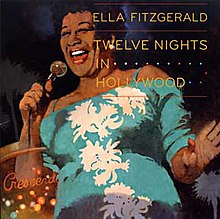Ella Fitzgerald’s Twelve Nights in Hollywood

Great fanfare greeted the release of Ella Fitzgerald’s Twelve Nights in Hollywood when it was issued in 2009. The four-CD set was culled from two extended engagements at the Crescendo Club in 1961 and ’62. The Crescendo was the location for an outstanding performance by Louis Armstrong and his All-Stars in 1955, long available in a set entitled California Concerts. But Ella’s Crescendo engagement surfaced only two years ago largely through the efforts of Phil Schaap, the indefatigable jazz researcher and radio host at WKCR in New York.
Ella sounds wonderfully at home and conversational on these impeccably-recorded performances of 76 songs, most of which were not staples of her concert repertoire. Lou Levy, Ella’s pianist between 1957 and ’62, said the First Lady of Song always sounded best in concert. “As good as Ella is in the studio, she’s far better in front of an audience,…With Ella it’s more like the jam session thing. Nothing very formal: Play the intro and you’re in….Straight in and enjoy the ride!” In addition to Levy, Ella’s sidemen include guitarist Herb Ellis, bassist Wilfred Middlebrooks, and drummer Gus Johnson, all playing with the kind of relaxed spontaneity that characterizes the best of jazz. Here, of course, the singer and her sidemen are among the greatest of all time.
Several of Ella’s most celebrated releases were concert recordings, including Ella in Berlin, Ella in Rome, Jazz at the Hollywood Bowl, and the 1973 career retrospective, Live at Carnegie Hall. It was the 1961 Berlin concert that yielded Ella’s hit version of “Mack the Knife.” But Twelve Nights offers something unique in the annals of her voluminous discography: a performance recorded in an intimate nightclub setting, here the 200-seat Crescendo. Several years ago Verve released Live at Mister Kelly’s, a 1958 set by Ella at the Chicago nightspot, but that now tastes like an appetizer before this sumptuous banquet.
Like most of her work for Verve Records, the Crescendo Club recordings were overseen by the label’s founder Norman Granz. Granz is the subject of a new biography by Tad Herschorn entitled Norman Granz: The Man Who Used Jazz for Justice. Granz died in 2001; Ella in 1996. In the book’s Epilogue, Herschorn writes that Twelve Nights’ commercial success is “the most recent evidence of Granz’s promotional talent,” and notes that Granz can be heard “stoking the fire as he calls tunes from the wings.” (Ella’s relationship with Granz, who guided her career from Swing Era icon to international star, is one of the major threads of the bio’s narrative, which I’ll report on here at a later date. It’s just out from the University of California Press.)
Here’s a link to the New York Times feature that heralded the release of Twelve Nights.
And here’s an NPR feature on Ella.